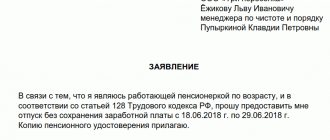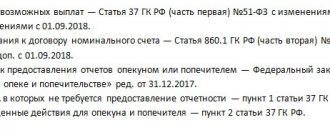What is an Emergency Will?
In accordance with the Civil Code of the Russian Federation, any will is drawn up in the form prescribed by law, after which it is certified by a notary or persons equivalent to it.
But it is not always possible to fulfill all the registration conditions. If a person cannot come to the notary’s office, a specialist goes to his home. If it is not possible to draw up a document in writing, an executor and a notary are invited. If these rules are not followed, the will is invalid.
The law provides for situations when a will is drawn up in a different manner. Based on Article 1129 of the Civil Code of the Russian Federation, execution of a document is possible not in the presence of a notary. A will is drawn up in simple written form if the testator is unable to come to the office and record his will. Permission is given upon the occurrence of circumstances that pose a clear threat to the life of the testator. In this case, a person cannot carry out the procedure within the framework of Articles 1124–1128 of the Civil Code of the Russian Federation.
Emergency circumstances are a difficult concept to understand. It is often identified with the term “emergency”. In accordance with Federal Law No. 68 of December 21, 1994, an emergency is understood as a situation that arises in the territory of a person’s residence during the occurrence of an accident, natural phenomenon, catastrophe, disaster. They can cause casualties, damage to health, material losses, and disrupt people’s living conditions.
In accordance with Order of the State Ecology Committee of the Russian Federation No. 120 dated March 1, 2000, all situations that threaten life and health can be divided into several types:
- natural disasters (geological, hydrological, geophysical);
- man-made situations (fires, accidents with the release of gas, radioactive substances, explosions, terrorist attacks);
- biological and social (diseases of people, animals, plants).
In any such situation, it is possible to make an emergency will.
Difference
A special feature of a will drawn up in emergency conditions is that it can be drawn up in simple written form. The document is signed by a person without notarization. Drawing up such a will is possible only in a situation in which the life of a citizen is threatened by someone or something. And because of this, a person cannot make a will in the traditional way.
A will drawn up in emergency conditions is not equivalent to a notarial will. It has a simple written form and is signed by the person who compiled it.
Emergency circumstances are situations that clearly threaten the life of a citizen.
They can be different:
- being in the area of combat operations as a participant;
- disease;
- being on a long voyage on a ship that is in distress.
Besides:
- mass riots;
- power conflicts;
- shipwreck;
- man-made accidents;
- earthquakes;
- floods.
A citizen, realizing that there is no other opportunity to express his will, can simply write it down on paper.
Document form
The form of a document drawn up in such conditions is not regulated by law.
But there are still a number of requirements:
- The legal capacity of a person at the time of drawing up a will must be confirmed.
- The document is drawn up if there is a real threat to the life of the testator. At the time of preparation, an emergency that has occurred or is occurring must be confirmed, in which it is not possible to contact a notary.
- The will is drawn up and signed by the citizen himself. Computers and other technical devices should not be used.
- The paper is drawn up in such a way that the will of the testator can be understood.
- The document is also signed by two witnesses. However, the law does not specify the maximum number of persons present.
Reference! If a citizen remains alive within a month after drawing up the document, and the threat to life has ceased, he must contact a notary to have the will certified. In the event of his death, the legality of the document is confirmed in court.
Conditions of preparation and witnesses
As noted above, there are no uniform characteristics for recognizing circumstances as emergency and those that threaten the life and health of citizens
Therefore, the judge takes into account subjective factors. For example, the occurrence of even the slightest infectious disease will cause concern if the person has a serious illness
Since there is no lawyer nearby, to guarantee the legality and voluntary execution of the document, it is necessary to involve two witnesses. Witnesses can be:
- only outsiders who are not related to the testator and members of his family;
- citizens who are adults or who have received full legal capacity before this period;
- people who do not suffer from mental illness, alcoholism and drug addiction.
During the consideration in court of a claim for acceptance of such an inheritance for execution, witnesses must be present to personally confirm the circumstances of the case.
How to Make a Will in Emergency Circumstances
Despite the absence of a will form, a citizen must follow the rules established by law for the preparation of documents of this kind.
It is important to include the necessary information. There are some considerations for making a will in emergency circumstances. Witnesses who are present at the time of preparation of the document must be legally competent persons.
The following cannot be accepted as witnesses:
- notary, citizens equal to him;
- the heirs themselves;
- illiterate persons;
- citizens who do not speak the language in which the will is drawn up.
Sample
You can use the following sample to draw up a document.
The will must stipulate:
- date and place of document preparation;
- information about the person transferring the inheritance (full name, passport details, registration address, contacts);
- data of citizens to whom property is transferred by will (full name, passport details, contact and address information);
- information about the transferred property (detailed characteristics, location);
- information about witnesses present at the time of drawing up the will;
- testator's signature.
Drawing up a will during an emergency or in emergency circumstances does not require that the document be drawn up briefly. It is necessary to describe the current situation in as much detail as possible so that it will be easier for the heirs to later prove their right to accept the property.
Download a sample will in emergency circumstances
Rules for writing and certification
The fundamental principles are enshrined in Article 1129 of the Civil Code of the Russian Federation. It is there that it is indicated exactly how the will should be formalized, what it should include and how to legitimize such a document.
It should be noted that this act is drawn up according to the general rules provided for a will under normal conditions, but there are some peculiarities.
Form
This document must be presented on paper, which means a written version of the document. Oral expression of will is impossible. The citizen is obliged to clearly express what exactly he wants to convey. As a rule, specific property is listed and heirs are indicated.
The document must be signed by the owner of the things to be transferred in the future and by the witnesses present at this action.
Conditions
It must be clear from the completed document that it is a will. You can also indicate that all property that a person had on the day of death passes through universal succession.
It is also necessary to indicate that the will was executed during an emergency. You can indicate what exactly these circumstances are and the moment of their occurrence. The closed type of this document is not allowed under the legislation of the Russian Federation.
Sample
The will should look like this:
Will
I, Sergey Sergeevich Petrov, born 03/03/1976, of sound mind and sober memory, bequeath all my property, which will be my property at the time of death to the following persons:
-Petrova Anna Sergeevna (born April 23, 2003)
-Ksenia Vitalievna Petrova (born May 21, 1980)
The will was drawn up by me in the presence of witnesses: Ekaterina Mikhailovna Smirnova, Valeria Dmitrievna Anerkot.
The will was drawn up in response to the typhoon.
Date of drawing up the act_____
Certification of the parties in the form of signatures______
Problems with a Will Made in Emergency Circumstances
A person has the right to express his will under any circumstances.
But problems with such a will may arise in the future. Judicial practice shows that the presence/absence of special circumstances is determined by the court. The body must rely on evidence provided by persons. Different life situations can be interpreted ambiguously.
For example, if a citizen’s health suddenly deteriorates due to a chronic disease, the court may not recognize this fact as an emergency circumstance. After all, the testator could have foreseen the occurrence of such consequences and should have taken care of visiting the notary in advance.
Thus, the Kirovsky District Court of St. Petersburg did not satisfy the claim of citizen A. to recognize B.’s will as valid. The plaintiff noted that the document was drawn up during a sudden deterioration in V.’s health in the presence of two witnesses. When considering the case, the court found that the testator had the opportunity to previously contact a notary to draw up a will.
In addition, the court must be provided with evidence that the document was drawn up in the presence of witnesses. Citizens must confirm the fact of drawing up a will in court.
In accordance with Article 1129 of the Civil Code of the Russian Federation, a will can be drawn up without the involvement of a notary in the event of emergency circumstances. The situation must threaten the life of a citizen. If the citizen remains alive for a month, the document must be properly certified. In the event of his death, the validity of the paper is confirmed in court.
What evidence will the court require to recognize the will as valid?
This requires evidence in the form of witness signatures and testimony, as well as expert opinions about the emergency situation that occurred. For example, this is a medical report drawn up based on the results of the autopsy and confirming the fact of death (somewhat extended in time, which made it possible to draw up a testamentary instruction).
Deadlines for filing a lawsuit
The right to inheritance is subject to execution only if the period allowed for this is observed - 6 months. There are also deadlines for filing a claim. However, their duration depends on the specifics of the claim, i.e. the reason for filing the claim. And in these cases the terms are longer.
Variations in limitation periods:
- a will characterized as void does not require proof, therefore the terms are not defined;
Under normal circumstances, a will that is not legally certified is void. Since extraordinary circumstances allow for the uncertified nature of the paper, here the nullity is confirmed not when it is written by hand, but, for example, when printed using technical devices and without signing. Then the identity of the text remains unproven.







